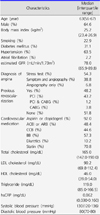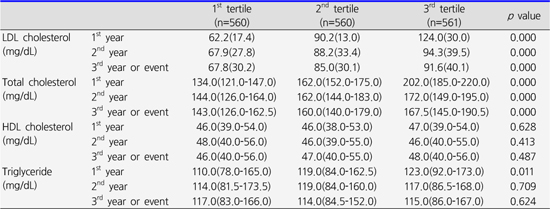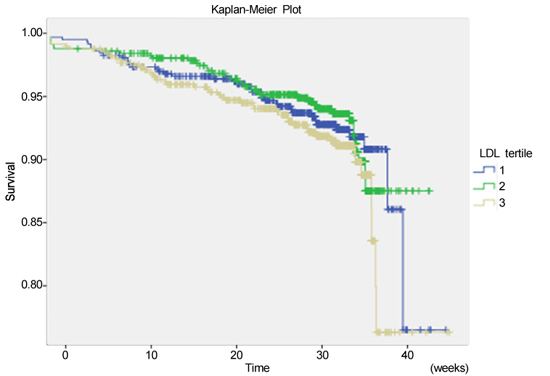Abstract
Background and Objectives
The aim of this study was to investigate the status of LDL-cholesterol level and its relationship with subsequent cardiovascular events in Korean patients with chronic stable angina.
Methods
The patients with stable angina were retrospectively and consecutively enrolled from out-patients clinic during 2007-2009. Mean follow-up duration was 3 years. Occurrences of major adverse cardio-cerebrovascular event (MACCE: a composite of death, myocardial infarction, unstable angina, coronary revascularization, cerebrovascular events, peripheral artery disease and aortic disease requiring hospital admission.) were compared by initial LDL-cholesterol levels using Cox proportional-hazards model.
Results
1,683 subjects were enrolled from 9 hospitals. Initial median LDL-cholesterol by tertile was 62.2, 90.2, and 124.0mg/dL respectively, however, the differences in LDL-cholesterol level among initial 3 tertile groups became narrow at 3rd year (67.8, 85.0, and 91.6mg/dL, respectively). MACCE occurred in 138 (8.2%) subjects, including 127 coronary events, 9 cerebrovascular events and 2 peripheral artery disease during the 3-year follow-up. The adjusted hazard ratio for MACCE was 1.02 (95% confidence interval 0.64-1.64) in the middle tertile of LDL-cholesterol, 1.53 (p=0.063, 95% Confidence Interval 0.98-2.40) in the highest tertile of LDL-cholesterol. The newly diagnosed diabetes mellitus was more frequent in subjects with statin treatment than subjects without statin during the 3-year follow-up (1.5% vs 0.6%).
Figures and Tables
Table 1
Baseline characteristics

GFR; glomerulus filtration rate, PCI; percutaneous coronary intervention, CABG; coronary artery bypass graft surgery, ACEI; angiotensin-converting-enzyme inhibitor, ARB; angiotensin receptor blocker, CCB; calcium channel blocker, BB; beta blocker, LDL; low-density lipoprotein, HDL; high-density lipoprotein, hsCRP; high sensitive C-reactive protein
References
1. Statistics Korea. Annual report on the cause of death and birth statistics 2013 [Internet]. Daejeon: Statistics Korea;2014. citied 2014 Nov 16. Available from: http://www.kostat.go.kr.
2. World Health Organization. World Heart Federation. World Self-Medication Industry. International Stroke Society (CH). Avoiding heart attacks and strokes: don't be a victim protect yourself [Internet]. Geneva: World Health Organization;2005. cited 2007 Jan 16. Available from: http://www.who.int/cardiovascular_diseases/resources/cvd_report.pdf.
3. Kris-Etherton PM, Yu S. Individual fatty acid effects on plasma lipids and lipoproteins: human studies. Am J Clin Nutr. 1997; 65:1628S–1644S.

4. Weggemans RM, Zock PL, Katan MB. Dietary cholesterol from eggs increases the ratio of total cholesterol to high-density lipoprotein cholesterol in humans: a meta-analysis. Am J Clin Nutr. 2001; 73:885–891.

5. Harris WS, Park Y, Isley WL. Cardiovascular disease and long-chain omega-3 fatty acids. Curr Opin Lipidol. 2003; 14:9–14.

6. Mensink RP, Katan MB. Effect of dietary fatty acids on serum lipids and lipoproteins. A meta-analysis of 27 trials. Arterioscler Thromb. 1992; 12:911–919.

7. National Cholesterol Education Program (NCEP) Expert Panel on Detection, Evaluation, and Treatment of High Blood Cholesterol in Adults (Adult Treatment Panel III). Third report of the National Cholesterol Education Program (NCEP) Expert Panel on Detection, Evaluation, and Treatment of High Blood Cholesterol in Adults (Adult Treatment Panel III) final report. Circulation. 2002; 106:3143–3421.
8. Grundy SM, Cleeman JI, Merz CN, Brewer HB Jr, Clark LT, Hunninghake DB, et al. Implications of recent clinical trials for the National Cholesterol Education Program Adult Treatment Panel III guidelines. Circulation. 2004; 110:227–239.

9. Son JI, Chin SO, Woo JT. The Committee for Developing Treatment Guidelines for Dyslipidemia. Korean Society of Lipidology and Atherosclerosis (KSLA). Treatment guidelines for dyslipidemia: summary of the expanded second version. J Lipid Atheroscler. 2012; 1:45–59.

10. Kim SH, Park JS, Zo JH, Kim MA, Kim HS. Treatment gap in the management of hypercholesterolemia in Korea: return on expenditure achieved for lipid therapy (REALITY). Korean Circ J. 2006; 36:593–599.

11. Sung J, Kim SH, Kim YD, Baek SH, Ahn Y, Lim DS, et al. Ten centers' study on the present state of treatment for hypercholesterolemia in patients with coronary artery disease. Korean J Med. 2005; 69:371–378.
12. Friedewald WT, Levy RI, Fredrickson DS. Estimation of the concentration of low-density lipoprotein cholesterol in plasma, without use of the preparative ultracentrifuge. Clin Chem. 1972; 18:499–502.

13. LaRosa JC, Grundy SM, Waters DD, Shear C, Barter P, Fruchart JC, et al. Intensive lipid lowering with atorvastatin in patients with stable coronary disease. N Engl J Med. 2005; 352:1425–1435.

14. Kim SH. Current treatment gap in Korea based on PRIMULA study. In : Abstract from the 54th Annual Scientific Meetings of the Korean Society of Cardiology; 2010 Oct 7-9; Grand Hilton Seoul Hotel. Seoul: The Korean Society of Cardiology;2010.
15. D'Agostino RB Sr, Grundy S, Sullivan LM, Wilson P. CHD Risk Prediction Group. Validation of the Framingham coronary heart disease prediction scores: results of a multiple ethnic groups investigation. JAMA. 2001; 286:180–187.




 PDF
PDF ePub
ePub Citation
Citation Print
Print








 XML Download
XML Download